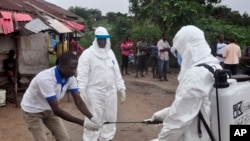Tests are underway to determine the genetic sequence of the Ebola virus behind an outbreak in central Africa, a U.S. Centers for Disease Control researcher said Friday.
Dr. Barbara Knust, an epidemiologist, told VOA's Horn of Africa service that scientists are looking for "clues" about where this strain of Ebola originated and how to treat it.
"That could help [us] understand how this virus is related to other viruses that have caused other Ebola outbreaks," she said.
The latest Ebola outbreak is in northern Democratic Republic of the Congo, in a remote area near the border with the Central African Republic. The World Health Organization said that as of May 24, Ebola had killed four people in the area and the number of suspected cases stood at 44.
The Ebola virus, which causes a type of hemorrhagic fever, killed more than 11,000 people across the West African countries of Guinea, Liberia and Sierra Leone in 2014 and 2015.
Resources 'mobilized quickly'
Staff from the CDC, the WHO, the Congolese Ministry of Health and other agencies are in Congo's Bas Uele province, working to contain the spread of the virus. Knust said the international response was going "fine."
"The responders involved in this outbreak very certainly are taking it seriously and the resources have been mobilized quickly," she said. "At least at this point of time [it] appears that it was detected fairly early, although that information is forthcoming. There is some hope it will remain a limited outbreak."
She said there had been discussion of using experimental treatments used in the West African outbreak, but that the Congolese government had not given its approval.
Dr. Galma Guyo, a disease control specialist in Nairobi, was part of an African Union team that responded to the Ebola outbreak in Liberia. He warned that the DRC's location in the center of Africa could allow the virus there to spread across borders.
"There is a possibility that the viruses can easily spread and be hard to detect due to the remoteness of the region, too," he said.




